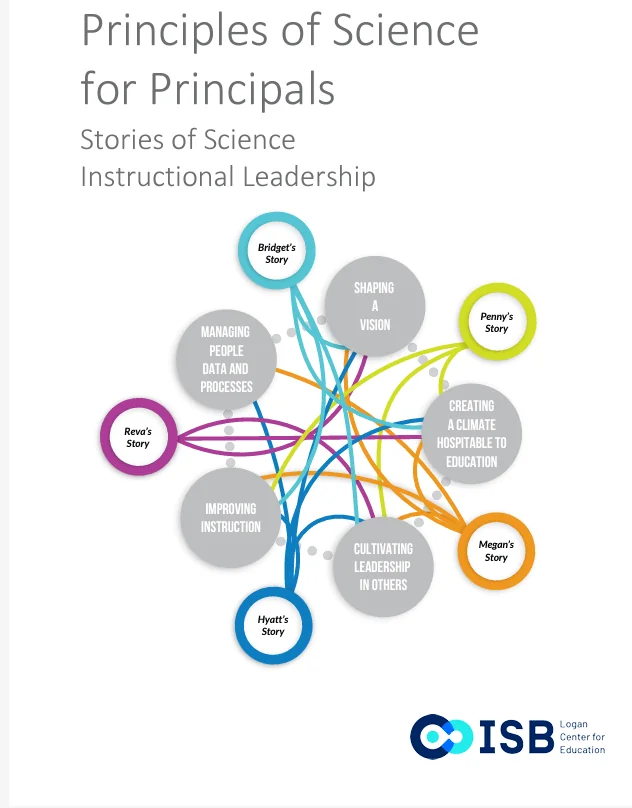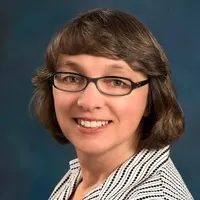2023-24 School Year ISB Education Highlights
In the final installment of the 2023-24 academic year roundup, we highlight some of the top projects the ISB Education team is working on. Throughout the summer, the ISB Education team was busy publishing research in a special edition of Connected Science Learning, hosting interns, and much more.

Each month throughout the 2023-2024 academic year, we will highlight some of the top projects the ISB Education team is working on.
June through September
Published! K-12 teachers can learn how to foster climate learning in their state

The journal Connected Science Learning featured several research papers by ISB Education members in a special edition highlighting climate justice education approaches, research, frameworks, and examples from the statewide ClimeTime network. You can find the entire edition here.
- Claudia Ludwig is an author of “Action and Engagement in Climate Science Learning Pedagogy.”
- Jen Eklund is an author of “Centering Climate Science in Learning.”
- Claudia Ludwig is an author of “Grounded in Community: Leveraging Partnerships for K–12 Climate Education.”
- Claudia Ludwig and Barb Steffens are authors of “Should Climate Science Be Local? YES!!”
- Jen Eklund and Caroline Kiehle are authors of “Make Climate Learning Happen Exactly Where You Are.”
High school students learn ‘Biosystems, Genetic Research, and Ethics’ and earn CTE lab science credits
Lead teacher Barb Steffens, along with teacher Siri Heinrich, ran the course “Biosystems, Genetic Research, and Ethics” for 47 high school students from the Washington Network for Innovative Careers (WANIC) districts across the Puget Sound region. During this summer course, students applied learning from SEE’s Environmental Influence on Gene Networks module and designed experiments and explored biotechnology, systems thinking, bioethics, and careers while earning a semester career and technical education (CTE) lab science credit. The students really enjoyed meeting scientists and interns at ISB for a day-long field trip.
Learn more: https://wanic.lwsd.org/academics/summer-courses
Summer interns learn alongside ISB researchers
Twenty undergraduates came long distances, 14 from out of state, to work with ISB science mentors on research projects. Additionally, they worked with other ISB staff to further develop professional skills including making and presenting posters, learning about graduate school pathways, and engaging in discussions about responsible conduct of research.
Nine high school students worked with mentors across four lab groups at ISB – Baliga, Hadlock, Hood and Subramanian Labs – to complete research projects. They presented their work at lab meetings and through a website they created. Thanks to eight generous sponsors – Platinum sponsors Kilroy, Douglas Howe, and Laurie Black; Gold sponsors Lightbridge Solutions, Key Bank, and Fremont Dock Co.; and Silver sponsors Rubenstein’s Contract Carpet and Graham Thompson – the students also participated in a 12-hour, collaborative STEM leadership program led by AmeriCorps Member Sarah Clemente.
Learn more https://see.isbscience.org/resources/for-students/leads/
Next-Gen Biology Learning Network brings big data to community college courses
The Next-Gen Bio Learning Network continued to grow over the past year, bringing together educators from community colleges across Washington and scientists from the Allen Institute and ISB to focus on big-data learning in introductory courses. During the all-ISB retreat in May, Dr. Jen Eklund led ISBers to work in small groups and consider some of the challenges that the network addresses. The group launched a new year of work together on September 9.
Learn more https://qubeshub.org/community/groups/nextgen_bio_learning
Leaders of K-12 science education participated in LASER Learning Event
Caroline Kiehle plays a lead role in LASER, the Washington state network of educators and administrators who support classroom teachers to provide high quality science education with equitable access for every student.
In June, teams from all nine Washington state regions participated in the webinar “Increasing Student Learning: A view of science, math, and literacy learning from Smithsonian Science Education Center.” Led by Dr. Amy D’Amico, we:
- explored new research on effective high quality instructional materials and professional learning,
- identified strategies for growing and sustaining effective science teaching and learning practices, and
- worked collaboratively to set up actions for science systems, for the next school year
Learn more about the Smithsonian Science Education Center here and Washington State LASER here.
May
Lincoln High School Genome Sciences Club visits ISB
Danielle Vermaak with the Genome Sciences Club at Lincoln High School brought 24 students to visit and tour ISB this month. Lincoln High students enjoyed touring the various labs with scientists from a variety of projects and specialities. Several students applied to ISB’s SEE “Systems Thinkers in STEM” Ambassador program and High School Internship.
‘Systems Medicine’ in high school and beyond
As part of the year-long Systems Medicine course at Ballard High School, Sara Calder chaperoned a field trip to North Seattle College. Students attended a career fair and toured the lab spaces of the EMT, nursing, and pharmacy technician programs. Systems Medicine is a Career and Technical Education (CTE) course that allows students to explore careers and gain exposure while still in high school.
ISB Education’s annual recognition awards
Three cheers to our 2023-24 awardees! At ISB’s annual offsite all-staff retreat, we awarded our two annual ISB Education recognition awards.
Melissa Zimmerman was awarded the JoAnn Chrisman Award for Distinguished Service to STEM Education.
Sevda Molani was honored with the Dr. Christine Schaeffer Award for Exemplary Service to STEM Education.
Awardees demonstrate:
- Respect for learners’ needs and talents, while inspiring and supporting personal and professional growth,
- A commitment to collaboration for the improvement of STEM education, and
- Impactful service to multiple parts of the education system, including students (professionals, graduate, undergraduate, high school), teachers, curriculum, administration, and community
ClimeTime annual data meeting
On May 7 and 8, the ISB Education team held the annual data meeting for about 40 science education leaders who run projects in Washington state’s ClimeTime program. ISB contributed 3 engaging parts during the two-day work session.
- Alex Carr, Sarah Clemente, Chris Lausted, Evan Pepper, Jake Valenzuela, Sid Venkatesh, and James Wilson led small groups in discussions and tours to grow their understanding of the research and discovery side of ISB.
- SEE interns Nastexo Nur, Phuong Tran, and Kally Chamberlain spoke with educators about their experiences students value in developing STEM pathways through school and life.
Jim Heath and Nitin Baliga expressed ISB’s value of the organizations and leaders who are working on parts of systems change to improve K-12 science education across our state.
April
Presented SEE’s classroom resources at the WA Climate Education Summit
ISB Educators Barb Steffens, Claudia Ludwig, and Sarah Clemente traveled to Spokane, Wash., for ClimeTime’s second annual Climate Education Summit. This year’s summit brought more than 100 educators from around Washington state to the Northeast Washington Educational Service District. First, Claudia hosted a table that served a constant stream of teachers, with curricular resources and contact information for future ISB professional development workshops. Meanwhile, Barb and Sarah attended workshops to advance their climate science teaching skills. Highlights included learning new strategies to teach with hope while exploring solutions to complex climate issues that are culturally significant, connected to local societally important topics, and rooted in justice. Next, the team presented a 50-minute hands-on workshop showcasing SEE’s eight climate-themed modules. The teachers and ISB team left the summit with many new and strengthened contacts, strategies, and resources for helping Washington state students engage in climate science learning across all subjects.
Learn more about ClimeTime here
Gearing up for SEE’s summer programs with high school students
The application for SEE’s high school summer programming closed on March 15. The SEE team is reviewing 313 applications for both ambassador and intern positions. In the coming months, we will conduct interviews and pair students with scientist mentors.
Learn more about opportunities for high school students.
High school science teachers collaborating all year

The Logan Center for Education continued working with the Central Kitsap School District as part of a 4-year project to support high school science teachers to enact high-impact, research-based learning strategies in their classrooms. ISB educators Caroline Kiehle and Jen Eklund and contractor partners John Leitzinger and Kim Harrington created a set of professional learning experiences:
Part 1 – August: Develop a 4-year theory of action to collaborate on increasing student science aspiration and understanding.
Part 2 – September: Gather student voice data (survey each science student about their thoughts about their own learning) to be repeated every semester in every science course.
Part 3 – October-April: Apply the results from the student voice survey to focus the teachers’ professional learning series.
- Run two Learning Lab cycles to study teaching impact by observing evidence of student learning.
- Experience how to empower students to do the “figuring out”, via using the SEE module “Intro to Systems.”
- Experience how to empower students to build awareness of systems thinking in context of STEM career pathways, via the SEE module “Systems Are Everywhere.”
Learn more here
March
Paper Published in Nature’s Humanities and Social Sciences Communications
A team of Systems Education Experiences (SEE) authors unveiled important insights and actionable protocols into providing equitable STEM experiences for high school students from historically marginalized communities. The research highlights the transformative power of informal STEM learning in addressing societal challenges and the ease with which many organizations could provide these important opportunities. Learn more through a video and overview here and access the paper directly here.

A Deep Dive into SEE Climate-themed Curriculum Modules
This month, ISB Education wrapped up a 9-hour professional development series that brought together elementary and secondary school teachers from across Washington state to earn STEM Clock Hours toward their certifications. The 6-week-long series was part of our ClimeTime project, which focuses on ensuring all students have meaningful climate science education by supporting teachers’ learning. One highlight was a PE teacher bringing climate-themed health and food security to his students through setting up an aquaponics system in their middle school gym. See photos and learn more here.
Two Events for Science/STEM Leaders to Learn and Collaborate
Washington State LASER – Leadership and Assistance for Science Education Reform – is a state science/STEM education leadership network in partnership with the Office of Superintendent of Public Instruction, Educational Service Districts, and ISB. Learn more at https://www.wastatelaser.org/.
- “Integrating Science in the Elementary Classroom: Strategies for Success”: On March 20, ISB participated in a Washington LASER learning event for educators/administrators supporting teachers across Washington state. Caroline Kiehle gathered case stories from each of the nine regions in the state to showcase examples of elementary science learning that also strengthens literacy and math skills.
- “Science For All” symposium at ISB: On March 28, ISB hosted a Puget Sound LASER event for the regional network of science/STEM leaders that provide the policy and support for science teachers and their students. John Leitzinger and Kirk Robbins (contractors) co-facilitated the in-depth work session.
February
Record number of undergrads apply for ISB Summer Undergraduate Research Experience Program
The application deadline for ISB’s undergraduate internship program closed on February 26. This year, 779 students applied to the program. In the coming months, ISB Education will be supporting ISB Scientists to interview and select students to join us for the summer.
Learn more about the Summer Undergraduate Research Experience Program.
Welcome new systems medicine teacher Dr. Cammy Umdor-Singh
Cammy is a new teacher at Nathan Hale High School who is jumping in and teaching ISB’s Systems Medicine course. She is the fourth teacher from Seattle Public Schools to help pilot these lessons. AmeriCorps member Sara Calder is helping Cammy distill the year-long course into one semester. Learn more about the systems medicine curriculum.
Giving systems thinking experiences to school leaders

We call it P4P. Principles of Science for Principals is a two-month series for school principals to grow their instructional leadership with new skills specific to science teaching and learning.
Drs. Jen Eklund and Sid Venkatesh are joining as our STEM professionals.
Scaling out from a partnership ISB has with Washington State LASER and ESD-113 in the Olympia region, we now have principals from across the state: Kennewick, Lake Stevens, Mukilteo, Hood Canal, Tumwater, North Thurston, Yelm, Ridgefield, and Washougal school systems.
Spatial Multi-Omics workshop
Nearly 2,600 people from around the world – over 40 countries – participated in the one-day, intensive Spatial Multi-Omics for Cancer Systems Biology virtual workshop on February 12. Spatial multi-omics is a new field within cancer systems biology. The course consisted of four sessions covering experimental methods, computational algorithms, applications of spatial multi-omics, and a practical methods tutorial.
Video recordings of the presentations will be available in the coming weeks.
January
ISB’s ClimeTime project is underway

ISB is conducting workshops for K-12 teachers several days a week through the spring. We use climate science phenomena as the centerpieces for learning science and for experiencing best practices in teaching. Learn more about ISB’s role at climetime.org/cbo-grantees/isb.
Washington’s ClimeTime gets a nod in this New York Times story: “For the subject matter to resonate with students, there should be more teacher training and instructional resources, said Mr. Branch, alluding to past studies that have revealed a lack of teacher exposure to climate change. He would like to see more states join California, New Jersey, Maine and Washington, which have earmarked funds for professional development on the topic.”
Welcome! Dr. Jan Chalupny joins the ISB Education team

Jan is leading the curriculum development efforts for our “Personalizing Disease Treatments” module. This module will ultimately be used as part of ISB’s 180-hour Systems Medicine course for high school 11th and 12th graders. Jan is building on her experience as an Amgen scientist and the “Cancer Biology: Diagnostics and Treatments” module she created for high school biotech courses through Shoreline Community College.

‘Demystifying Machine Learning’ module published
The module, for high school students, was created through ISB’s Innovator Award Program and is currently being used as part of the Systems Medicine course at Ballard, Roosevelt, and Franklin High Schools in Seattle Public Schools.
November-December
Gratitude!
We are excited to spend time with our friends and family this season. Did you know that ISB Education has friends too? We are so grateful for the many people and organizations who worked with us as both thought and work partners in 2023.
ISB – Partnerships for us to provide professional experience for undergraduates and undergraduate faculty

Learn more: logancenter.isbscience.org/resources/college-faculty-toolbox and isbscience.org/careers/internships/summer-undergraduate-research-experiences-program
ClimeTime – Partnerships for us to contribute to the WA climate science K-12 initiative

Learn more: climetime.org/esd-grantees and climetime.org/deepening-students-understanding-of-weather-and-climate
SEE – Partnerships for us to develop and field test curriculum for high school classrooms

Learn more: see.isbscience.org/resources/for-partners
SEE – Partnerships for us to provide hands-on, rigorous research experiences for high school students

Learn more: see.isbscience.org/resources/for-students and see.isbscience.org/resources/for-students/esore
LASER – Partnerships that evolve the statewide network of science/STEM leaders

Learn more: wastatelaser.org
Local School Districts – Partnerships for us to lead systemic change

Learn more: logancenter.isbscience.org/our-work
October
Get to know AmeriCorps member Sarah Clemente

Sarah Clemente recently joined ISB as a Systems Thinkers in STEM Ambassador Coordinator, and is the third AmeriCorps member to work with us. In this Q&A, Clemente shares what drew her to ISB, what she hopes to accomplish over the next year, and more.
Next-Gen Bio Learning Network launched
The Next-Gen Bio Learning Network, led by Dr. Jen Eklund, launched an annual series of academic-year workshops providing opportunities for community college faculty and research scientists to learn from each other. This is the start of the second year of a 5-year project funded by the National Science Foundation with the goal of preparing community college students to engage with big data in biology. The project draws on the ISB Education team’s expertise in K12 teacher learning. The project is a collaboration with faculty from 19 colleges, the Washington State Board of Community and Technical Colleges, and scientists from six Washington state research institutes.
Teachers and school district leaders from across the U.S. learn how to bring the yearlong Systems Medicine course to their high school


Claudia Ludwig and Sara Calder presented a hands-on learning experience that highlighted free Systems Medicine resources at the National Consortium for Health Science Education (NCHSE) National Conference. Participants explored curricular materials that support high school students in developing the skills and knowledge necessary to advocate for individual and community health in preparation for future interdisciplinary STEM and health careers.
ISB had a flurry of education and outreach activities during this month! A few other highlights are listed here.
- The Gibbons Lab hosted over 1,000 participants in the 2023 ISB Virtual Microbiome Series.
- Dr. Wei Wei and ISB’s Facilities group coordinated tours across ISB for more than 70 visitors from the Biomedical Engineering Society.
- ISB Education worked with ISB’s Dr. Kengo Watanabe and Professor Ruben Murcia from South Seattle Community College to host Japanese high school students for a lab visit.


